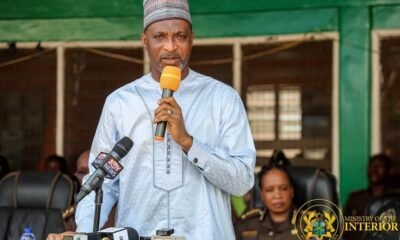Editorial
Cedi depreciation: How significant are the arrests?
Dear Editor,
I read in the news recently how officials of the Bank of Ghana (BoG) and security operatives descended on some illegal forex traders in Accra.
Report indicated that over 70 individuals and entities engaged in the business of buying and selling foreign exchange without licence from (BoG) were arrested. Areas such as the Rawlings Park, Makola, and Tudu in the Central Business District of Accra were ‘raided.’
The law enforcers and the BoG indicated that the ‘black market dealers’ were contributing to the rapid depreciation of the Cedi to the dollar and major foreign currencies, therefore, the operation was part of ‘strategies’ to sanitise the foreign exchange market.
Seeing pictures of some of the ‘illegal operators’ in handcuffs, I wondered if those who led the exercise were honest in explaining the exact motive of the arrests.
For me, it all amounts to window dressing of the exact causes of the Cedi depreciation, which stares at us all. If, indeed, illegal forex traders were contributing to a fall in the Cedi, why wait until September 2022, to arrest these people who have been operating since Adam?
Again, I wonder how long it would take to arrest all the people trading on the black market for the fragile Cedi, to compete favourably with other currencies.
The arrests would yield an insignificant result, even if it is considered one of the solutions. Our leaders should admit that their foot is no longer on the pedal when it comes to managing the economy, and that politicising cedi depreciation and other economic situations solve nothing.
George Ofori Nkoom,
Larteh-Akwapim, E/R
Editorial
Kudos to Ho Teaching Hospital staff, but …
Dear Editor,
If there is any group of professionals that get bad-mouthed the most, then you are referring to nurses and medical doctors assigned to public hospitals across the country.
For this particular letter, I want to sing the praises of this same group of professionals that work at the Ho Teaching Hospital, famously known as Trafalgar.
Despite the work load and the mass casualties received at the emergency ward of the hospital, the welcoming nature of the nurses and the professional touch by the doctors can’t be ignored. My personal experience has got me travelling from my base in Accra to seek medical services from these professionals.
Special mention has to be made of the likes of Precious of the Pharmacy Department, Dr Brandon Banor (a maxillofacial resident) of the Dental unit, male nurse Justice assigned to the female surgical ward. Words cannot really do justice to their affable, professional caring nature. A simple thank you is all that I can say.
In the same vein, I can’t but call out the bad attitude of the auxiliary staff and contractors of the hospital.
Chief among them is some of the contracted bank staff that handle the payment section of the hospital and the patient registration section (those that check the status of the patient as to whether they are fee paying patients or NHIS sponsored).
The attitude at times leaves a bad taste in the mouth. One such occurrence was a night staff of the registration section who had her legs on the office table whilst talking to patients.
The CEO of the hospital needs to shine his torch light on this support sections before they erode the awesome performance of the direct medical staff of the hospital.
Thank you for the space.
Kwesi Manu
Accra
Editorial
Develop policies to address disability concerns
Dear Editor,
AT the beginning of the year, when I went to the bank to deposit money into my uncle’s account, I observed a very sad situation where a man in a wheelchair struggled to navigate his way around the facility.
This is because the structure is disability unfriendly.
As I stood and watched how the man struggled to move his wheelchair, I felt sad and wondered if this is how the life of a disabled person should be. It becomes worse if there is no one to offer help.
In Ghana, People With Disabilities (PWDs) are often treated differently and are often subjected to all forms of discrimination.
Most of these people find themselves in such a situation as a result of unfortunate happenings such as accidents and injuries.
It is, therefore, not appropriate for anyone to discriminate against them. Discrimination against such persons take many forms, including how buildings are constructed.
Most of the public structures are not disability friendly and impede their movement.
As a country, we should consider the PWDs in designing our structures. I also think that there should be a national policy that seeks to address this issue.
I have a strong conviction that when such a policy is developed by the government, people with disabilities would feel appreciated and also promote social inclusivity.
Ray,
Kasoa







